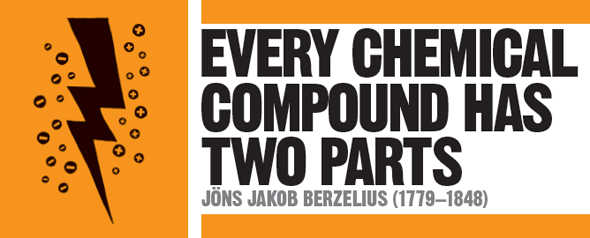
IN CONTEXT
Chemistry
1704 Isaac Newton suggests that atoms are bonded by some force.
1800 Alessandro Volta shows that placing two different metals next to each other can produce electricity, and so creates the first battery.
1807 Humphry Davy discovers sodium and other metal elements by splitting salts with electrolysis.
1857–58 August Kekulé and others develop the idea of valency – the number of bonds an atom can form.
1916 US chemist Gilbert Lewis proposes the idea of the covalent bond in which electrons are shared, while German physicist Walther Kossel suggests the idea of ionic bonds.
The leading light of a generation of chemists inspired by Alessandro Volta’s creation of the battery, Sweden’s Jöns Jakob Berzelius conducted a series of experiments looking at the effect of electricity on chemicals. He developed a theory called electrochemical dualism, published in 1819, which proposed that compounds are created by the coming together of elements with opposite electrical charges.
In 1803, Berzelius had teamed up with a mine owner to make a voltaic pile and see how electricity splits salts. Alkali metals and alkaline earths migrated to the pile’s negative pole, while oxygen, acids, and oxidized substances migrated to the positive pole. He concluded that salt compounds combine a basic oxide, which is positively charged, and an acidic oxide, which is negatively charged.
Berzelius developed his dualistic theory to suggest that compounds are bonded by the attraction of opposite electrical charges between their constituent parts. Though later shown to be incorrect, the theory triggered further research into chemical bonds. In 1916, it was found that electrical bonding occurs as “ionic” bonding, in which atoms lose or gain electrons to become mutually attractive charged atoms, or ions. In fact, this is just one of several ways in which the atoms in a compound bind – another is the “covalent” bond, in which electrons are shared between atoms.
"The habit of an opinion often leads to the complete conviction of its truth, and makes us incapable of accepting the proofs against it."
Jöns Jakob Berzelius
See also: Isaac Newton • Alessandro Volta • Joseph Proust • Humphry Davy • August Kekulé • Linus Pauling